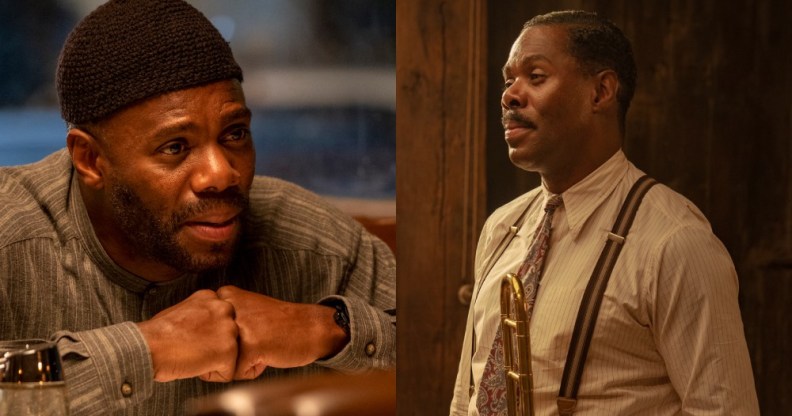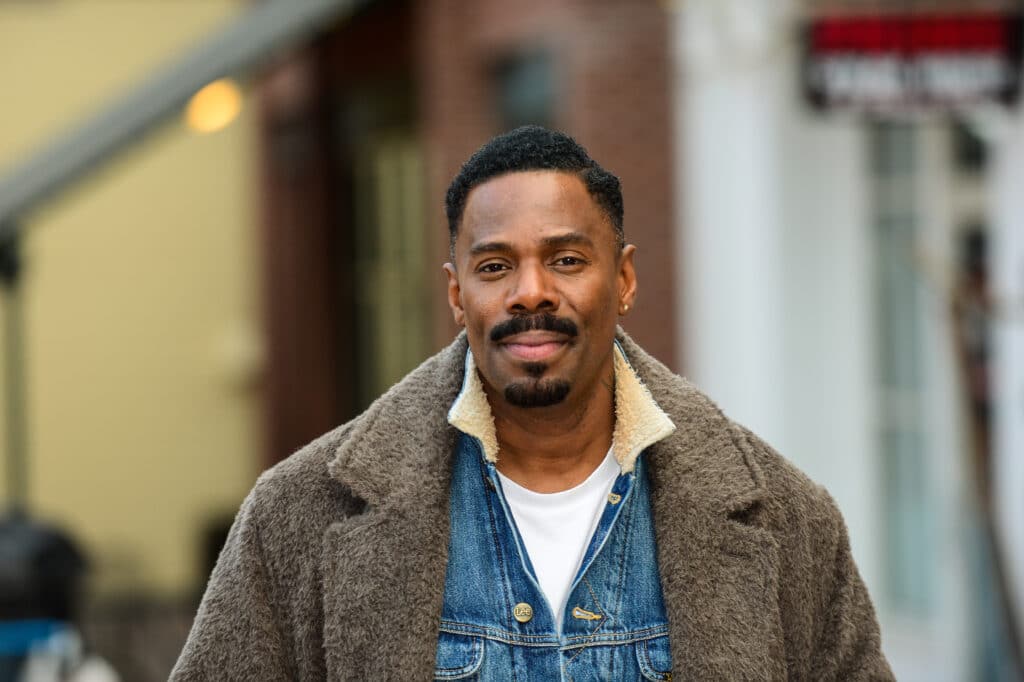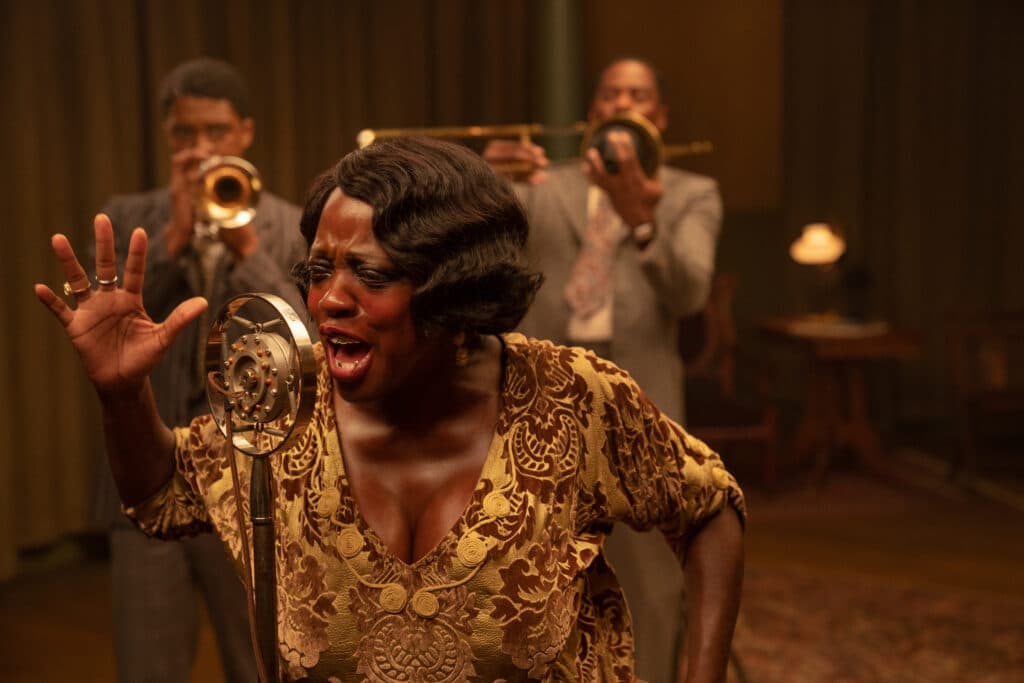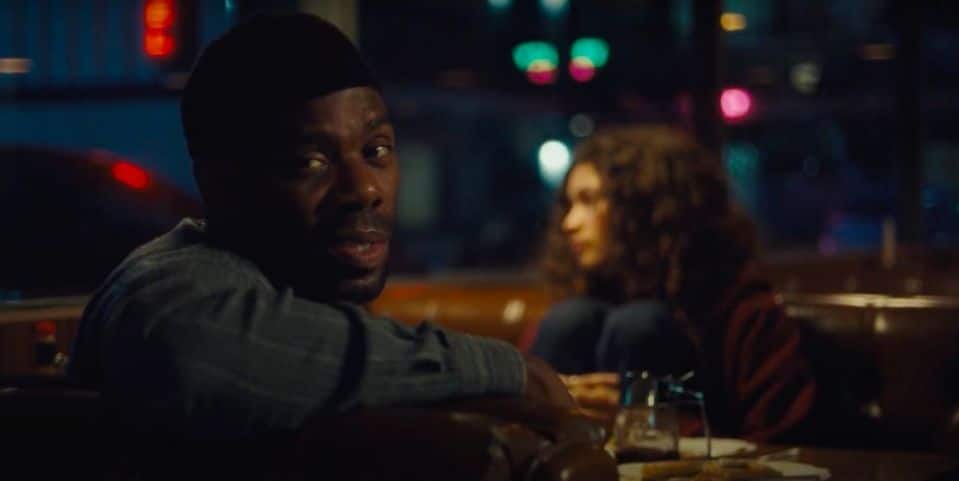Ma Rainey actor Colman Domingo on helping Chadwick Boseman ‘fly’, Euphoria and Candyman

Colman Domingo in Euphoria and Ma Rainey’s Black Bottom. (HBO/Netflix)
Colman Domingo on the success of Ma Rainey’s Black Bottom, Euphoria, and what it would be like if Beyoncé was gay.
Colman Domingo is the definition of booked and busy. A 51-year-old out and proud actor, director and writer, he’s closing in on three decades in the business. Fresh off a key role in the Oscar-nominated Ma Rainey’s Black Bottom, he’s also part of two hit series – Fear the Walking Dead and Euphoria – and will appear in two of the most eagerly-anticipated cinematic releases of 2021.
First, he’ll play a villainous sex trafficker in Zola, based on a wildly viral Twitter thread, directed by Janicza Bravo from a script written with Jeremy O. Harris (the acclaimed Slave Play). Then, he’ll appear in the delayed Candyman reboot from Jordan Peele (Get Out) and rising star Nia DaCosta.

Colman Domingo. (Getty)
PinkNews: How did you arrive at Ma Rainey’s Black Bottom? What drew you to her story?
Colman Domingo: I saw the production of it on Broadway many years ago with Whoopi Goldberg. I remember how affecting it was because there was so much about Ma Rainey that I didn’t know. I didn’t know that she was an openly bisexual, blues singer who’s referred to as the Mother of the Blues. I thought that was pretty bold at a time, in 1927, as an African American woman from the south, who has figured out her own sort of power structure and how she lives in it.
She’s one of the oldest examples of someone who was self-possessed enough to believe in our talents and our work. I think that was audacious, especially at that time. It’s still audacious. There are still many people who are not completely open with their sexuality, who are at the level of Ma Rainey at her time. It’s like if Beyoncé was openly gay, I don’t think we have that sort of figure in modern culture.
What’s your experience been as someone who’s been openly gay throughout his career?
You know, I didn’t recognise that what I was doing in this industry was anything unusual until someone pointed out to me, you have a very unique experience in Hollywood. You’re not marginalised by your sexuality, you’ve played more heteronormative characters than most out actors. And I didn’t recognise that. I’m someone who’s always been out. I think I’ve never led with my sexuality, I lead with being an artist, a Black artist – being gay is a part of it as well, it’s a wonderful, vital part of it. But I’ve never put any limits on my own career and what I can do or what I can play, so I think that I’ve been received as such.

Colman Domingo was a ‘true supporting character’ to Viola Davis’ and Chadwick Boseman’s leads. (Netflix)
What do you see as your character Cutler’s part in the story of Ma Rainey’s Black Bottom?
I think my character Cutler is the glue to the whole thing. I think of him as a person who is navigating all these tricky systems. And I think that he is Ma’s proxy when she’s not in the room. So he has a power attached to Ma. And also, he’s the first person that these white institutions see or have conversations with, so he’s got to navigate that, and he uses a bit of code switching. And also, he’s the leader of the band. So he’s got to be as real and colloquial as the rest of the band, and understand these men. I think he’s got a great balancing act, and he is truly, I think, a supporting character, in terms of making sure that he can lay the foundation so Levee [Chadwick Boseman’s character] can fly the way that he does, or so that Viola [Davis]’s Ma can be as rough and ready as she can be. Sometimes you need a character playing the bass notes so that they can play the top.
The response has been incredible, and it’s been so good to see Chadwick Boseman’s performance being recognised [we spoke a few days after he was posthumously awarded the Golden Globe for Best Lead Actor].
I know that Chad did his best work, and I’m glad it’s received as such. A lot of times people give their best work and it’s not received, and that’s just the truth. But I’m glad that committees and voters saw the truth of what Chadwick has pulled into in his performance, and I do believe it is the best leading male performance of the year. I think he gave his blood sweat and tears. He poured his fears into it, he poured his life into it. It’s a legacy film for him.
You and Zendaya recently made a really powerful return to Euphoria. Was it as intense to make as it was to watch?
Listen, Sam Robinson delivered me a script, in the middle of the pandemic, in the middle of Black Lives Matter marches in the streets, cities being on fire. He delivered a script, and I was so moved by it, because I felt he was truly responding to the time. The conversation was about what we all struggle with, that struggle of faith, of finding your place in the world, of addiction. The questions of what a revolution is, and how you can be a part of it.

Colman Domingo and Zendaya in Euphoria. (HBO)
I wanted to put everything to it, I know I poured everything I had into it. I put myself through a rigorous rehearsal of about 40 hours a week, just in my own home office. So I did that for maybe 120 hours. I didn’t want there to be a performative nature around this episode. I thought the trick of this episode was to really make it feel like you’re a fly on the wall, you’re just with these two people who have nothing to lose on Christmas Eve, which is the most bittersweet part of the holiday. I think the whole episode feels like that song, “Have Yourself a Merry Little Christmas”, which is anything but a merry song, it is very bittersweet. And it calls on all things, pain and trauma and heartache, and a little bit of faith for the future.
When it comes to choosing stories to tell, what do you look for?
A lot of the time, I’m looking for something that scares me, something that is going to change me or devastate me, is going to make me rethink art, is going to help me rethink my place in the world and what my purpose is. Things where I believe that I can give my whole heart and soul to it, and it’s not just about entertainment, but it’s also about moving the needle on humanity. That’s the truth. I’m drawn to things like that, but they’re few and far between.
In my career, I feel like I’ve steered clear, mostly, from fluff. I’m probably one of the people who’s been in most of the modern historic films about Black life in the past 20 years. And it’s because they’re purposeful, and that’s what I try to do with my art, is to make a difference.
You’re in the upcoming Candyman film – we don’t really know much about it [other than that it takes place in the now-gentrified Cabrini Green housing project of the original, and that Colman Domingo plays a a “Cabrini Green “old-timer”, according to Variety].
Can you tell us anything?
No! [Laughs] I can tell you that you’re gonna be surprised. It is very much a spiritual sequel to the first one. I think that they made an excellent choice to hold off on delivering the film, because I’ve seen it, and it is to be viewed in a theatre. It is cinematic; you need to share it, you need to take gasps with the person right next to you.
Was the original a film you’d connected with previously?
I just looked at it as source material. When I joined Fear of the Walking Dead, I didn’t watch The Walking Dead because I wanted my experience to be this insular experience. So I felt the same way with Candyman. I watched it once; I didn’t want to know too much. My character is a citizen who has lived in the Cabrini Green project, so I only want to watch it once, I didn’t want too much detail on it, but it thought it was good information that my character needed to know.
This summer we’ll see you in Zola, too, co-written by Jeremy O. Harris [Slave Play, Daddy].
Yes. I am beyond excited for people to see Zola. It is such a dark, dark comedy. It’s a weird ride from Detroit to Florida, and it’s about many things, but it’s about these two young girls who want to go and make some money dancing and they get caught up in terrible stuff in one weekend. I play a true villain. I play a guy who is trafficking in women, but I wanted to include a character that will challenge you. He’s still human, he still has his dreams, he still has his wishes. He just doing it in a very terrible way. He’s a character that no one has ever seen me play.
Colman Domingo can be seen in Ma Rainey’s Black Bottom on Netflix now. Zola is slated for US release on 30 June, with Candyman to follow on 27 August.

